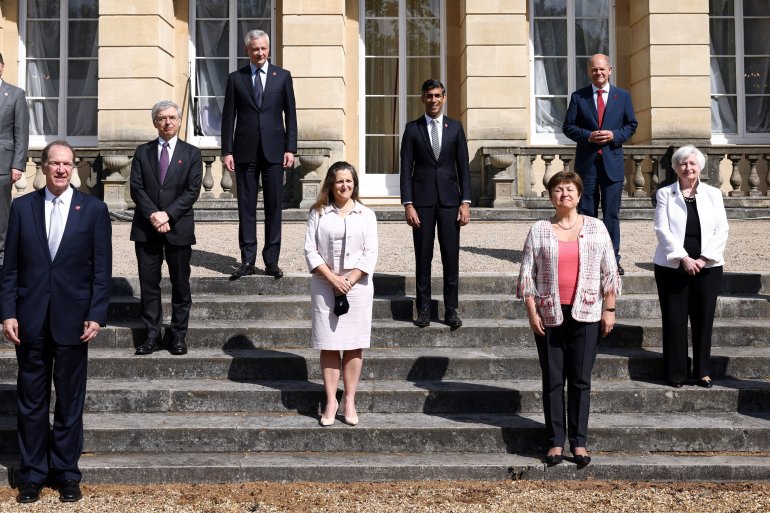
From Left, European Commissioner for Economy Paolo Gentiloni, Eurogroup President Paschal Donohoe, President of the World Bank David Malpass, Italy's Economy and Finance Minister Daniele Franco, France's Economy and Finance Minister Bruno Le Maire, Canada's Finance Minister Chrystia Freeland, Britain's Chancellor of the Exchequer Rishi Sunak, Managing Director of the IMF Kristalina Georgieva, Germany's Finance Minister Olaf Scholz, US Treasury Secretary Janet Yellen, Secretary-General of the Organisation for Economic Co-operation and Development (OECD) Mathias Cormann, and Japan's Finance Minister Taro Aso pose for a family photoon the second day of the G7 Finance Ministers Meeting, at Lancaster House in London on June 5, 2021. - Finance ministers from wealthy Group of Seven (G7) nations are on Saturday expected to announce support for a minimum global level of corporate tax, aimed at getting multinationals -- especially tech giants -- to pay more into government coffers hit hard by the pandemic. (Photo by HENRY NICHOLLS / POOL / AFP)
G7: Rich nations back deal to tax multinationals
The G7 group of advanced economies has reached a “historic” deal to make multinational companies pay more tax. Finance ministers meeting in London agreed to battle tax avoidance by making companies pay more in the countries where they do business.
They also agreed in principle to a global minimum corporate tax rate of 15% to avoid countries undercutting each other.
Tech giants Amazon and Facebook are among those likely to be affected.
The deal announced on Saturday, between the US, the UK, France, Germany, Canada, Italy and Japan, plus the EU, could see billions of dollars flow to governments to pay off debts incurred during the Covid crisis.
Negotiated over many years, it will put pressure on other countries to follow suit, including at a meeting of the G20 next month, which includes China, Russia and Brazil.
US Treasury Secretary Janet Yellen told reporters that the “historic” agreement on a global minimum tax would “end the race to the bottom in corporate taxation and ensure fairness for the middle class and working people in the US around the world”.
UK Chancellor of the Exchequer Rishi Sunak, who hosted the summit, said the agreement would make the global tax system “fit for the global digital age”.
His German counterpart, Olaf Scholz, said it was “very good news for tax justice and solidarity and bad news for tax havens”.
“Companies will no longer be in a position to dodge their tax obligations by booking their profits in lowest-tax countries,” he said.
Read Also – Mahmood Ahmadu, Like Okonjo Iweala, is making Nigerians proud globally
Why did they want to change the rules?
Governments have long grappled with the challenge of taxing global companies operating across many countries.
That challenge has grown with the boom in huge tech corporations like Amazon and Facebook.
At the moment companies can set up local branches in countries that have relatively low corporate tax rates and declare profits there.
That means they only pay the local rate of tax, even if the profits mainly come from sales made elsewhere. This is legal and commonly done.
The deal aims to stop this from happening in two ways.
Firstly the G7 will aim to make companies pay more tax in the countries where they are selling their products or services, rather than wherever they end up declaring their profits.
Secondly, they want a global minimum tax rate so as to avoid countries undercutting each other with low tax rates.
Source – https://www.bbc.co.uk/